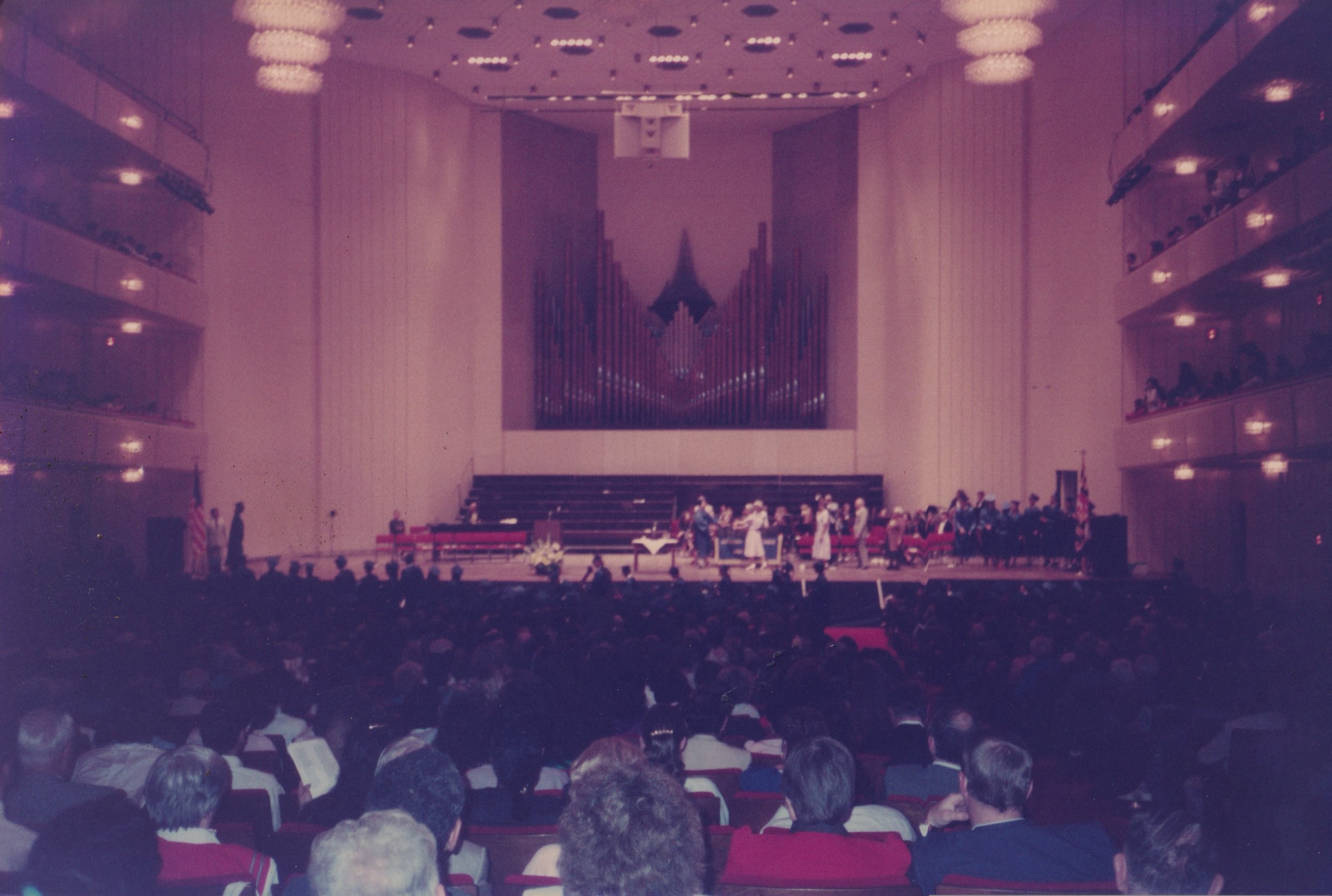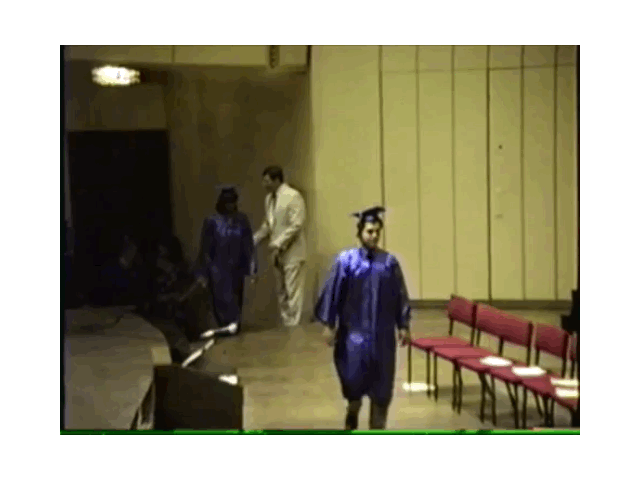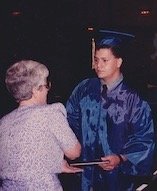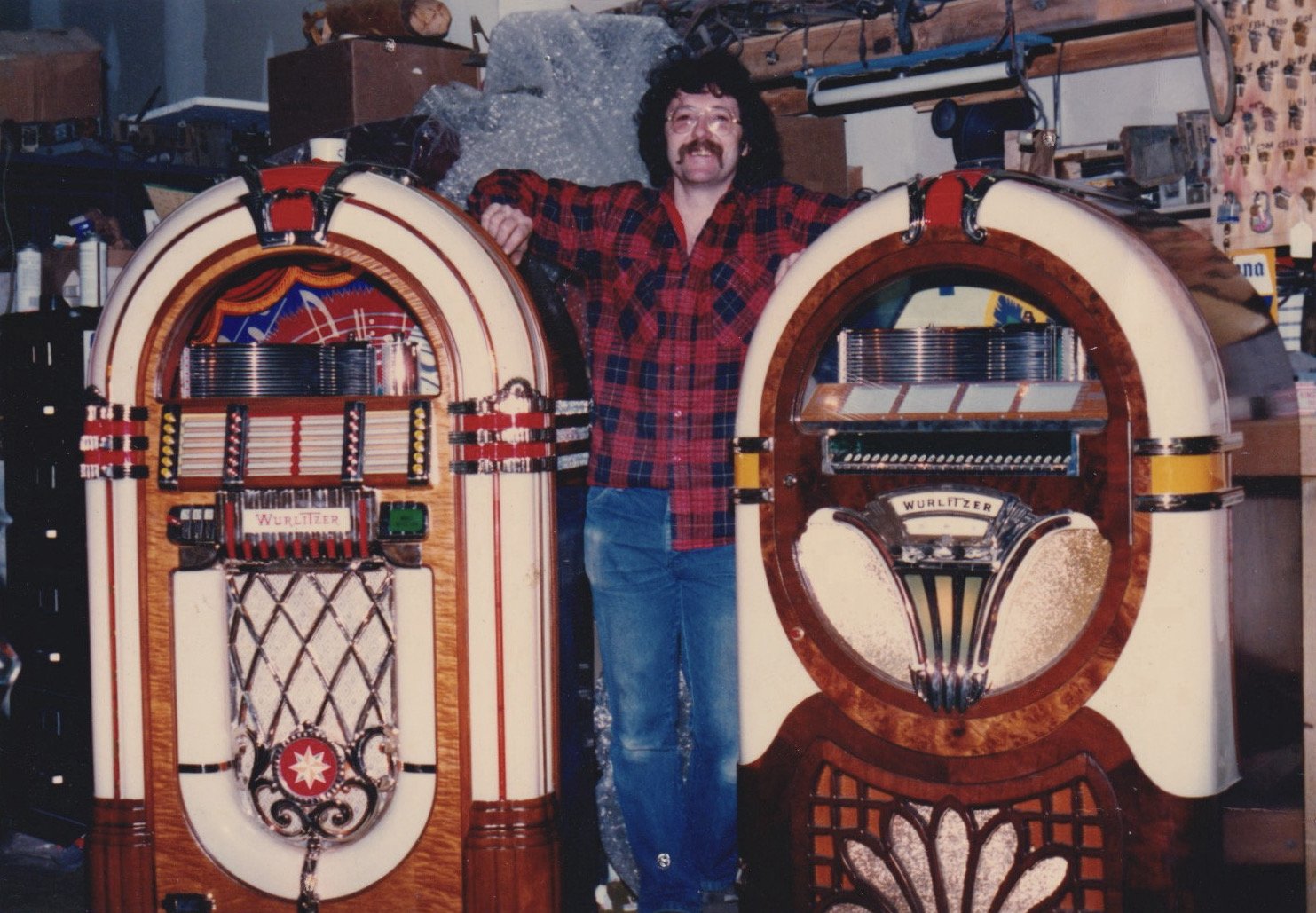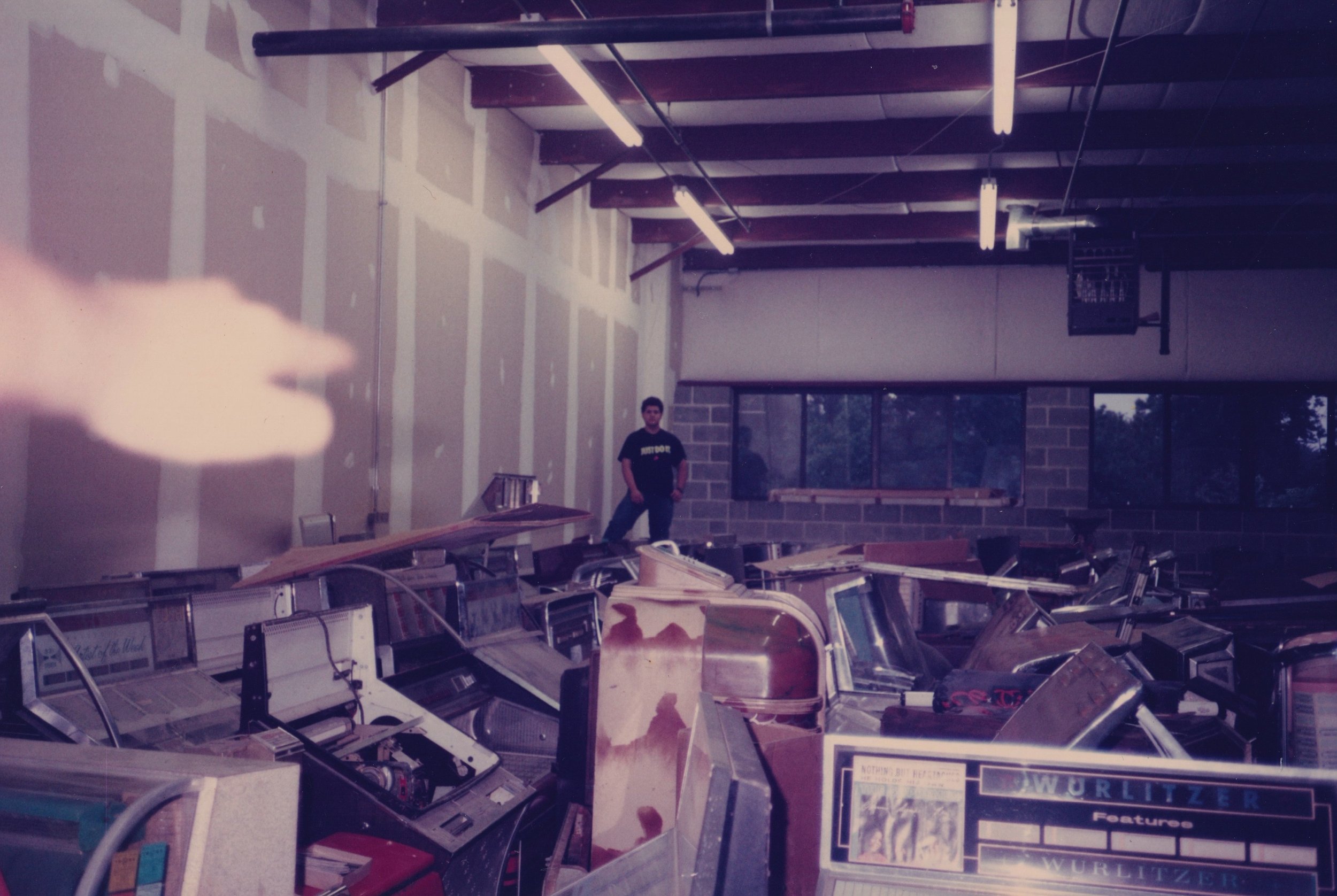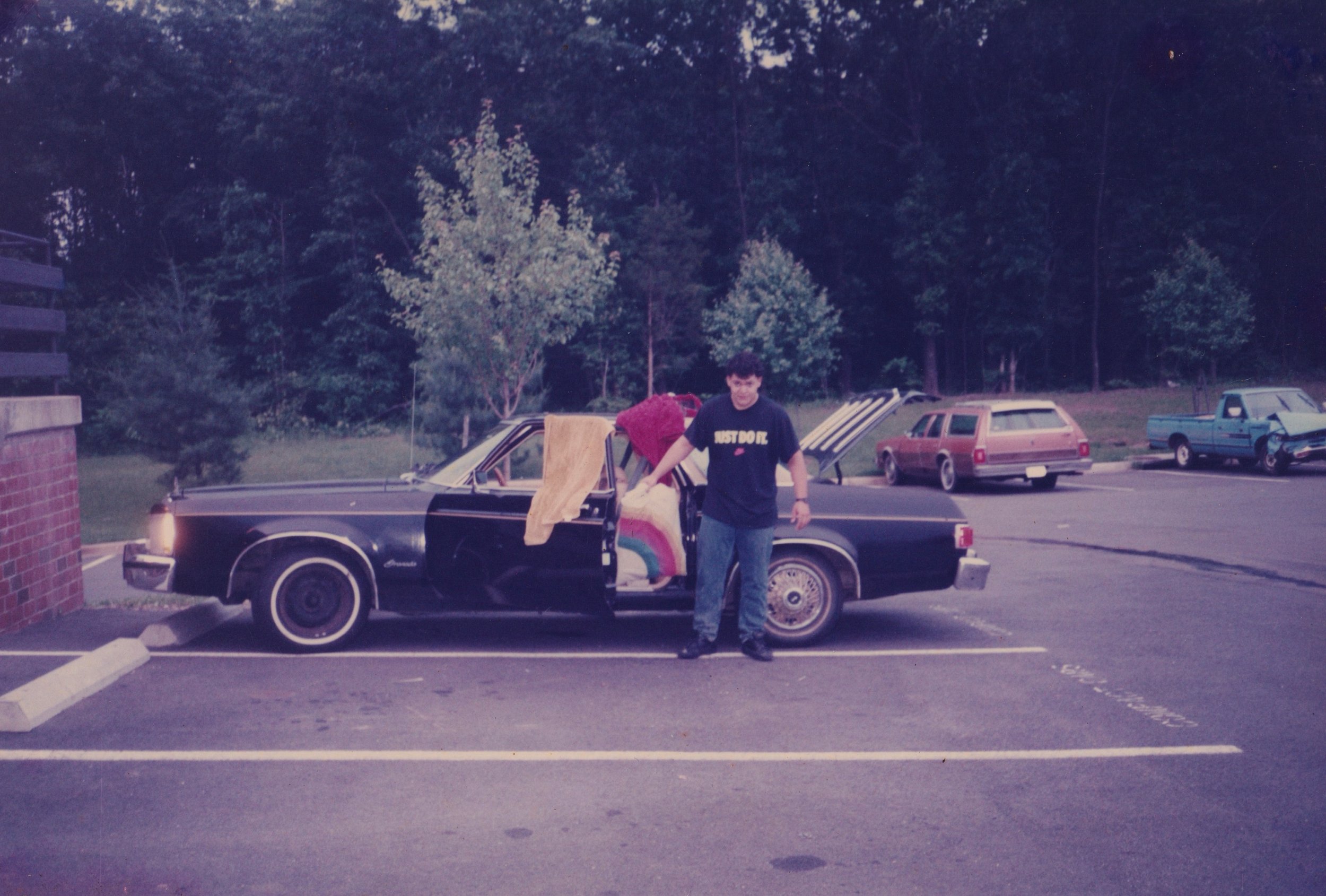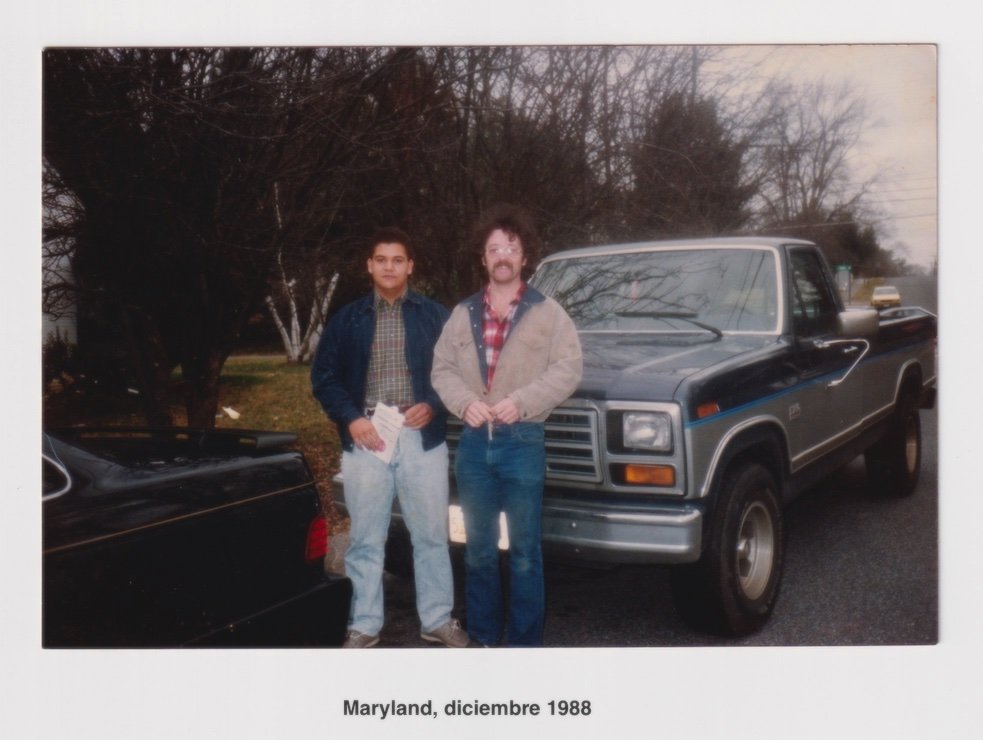Posted: February 12, 2022
Hosehead
Graduation day at the Kennedy Center, Washington, D.C., June of 1990.
In 1990, in my high school senior year, for no other reason than to keep me out of trouble, someone at home decided that I should go and help a relative of mine at a jukebox restoration company in Sterling, Virginia, USA, and hopefully learn something useful in the process. Jukebox Classics was the name of the shop. I don’t know if the shop still exists.
The guys there were pretty cool. They took me in without hesitation, almost like a mascot, in a way. I did the nastiest jobs they could find for me, but I never complained; I was learning the ropes, and I felt welcome and accepted, and I was quite content with that.
My work consisted mostly of scrubbing, scraping, brushing, washing, wiping, dusting, mopping, sweeping, and sorting… and something the guys at the shop called zepping [zep: a strong, ammonia-based, industrial cleaner/degreaser]. My hands still recall the numbing, ice-cold smell of zep on stainless steel and chrome in the late hours of the winter evenings.
Of all the things I can recall about my high school years, my days at the shop are the memories I treasure the most. The work was tough enough, but it was also lots of fun. I have never seen another workplace quite like Jukebox Classics at that time. There was always a new experience waiting to pop up at any minute, and I loved it.
Every single day there would be an endless parade of very unusual characters, like a truck driver whose face you could not actually see—not even his mouth while he was talking. He had long hair down to his shoulders and a mustache that cascaded over his beard which in turn reached down to his chest. I had never seen anything like that before, but I thought it was a fantastic look! There was also a high school teacher, Tom, who spoke latin and whose obsession with classic jukeboxes made him visit the shop almost every day. He was a great guy! He was never too busy to converse with me and had the most interesting stories to tell. A teacher, a historian, and a jukebox aficionado, Tom was always on a quest for knowledge—Cheers, Tom! Wherever you are!
People were always coming and going at the shop. Actual costumers came to the shop mostly on the weekends and, almost invariably, they wanted to get their hands on a Wurlitzer Bubbler. There were usually one or two well put-together machines at the shop, but, as expensive as they were, they went fast.
Usually, the process was that the costumers would see a finished machine, fall in love with it, and hear they could not have it because it was already sold, so they had to pick another one from the unfinished lot.
It was always interesting to see the customers’ reactions to the unrestored machines. I, myself, having witnessed the restoration process a number of times, having even participated in the restoration process a number of times, still was amazed at how something as neglected, in such a state of disrepair and utter ruin, could be brought back to life looking as gleamingly gorgeous as they did.
Roger showing off two of his finished Wurlitzers.
On a regular work day, most people came looking for parts or looking to sell parts. Some people would just show up unannounced with a truck-full of old vending machines, pin-ball machines, arcade stuff, and even some very creepy-looking coin operated puppet machines that, when powered, would randomly and suddenly start playing music—which was absolutely fine during working hours but gave me the goosebumps at night whenever I stayed at the shop all on my own. I never did tell the guys who it was that kept unplugging the dammed machines!
Spending nights alone at the shop would not have been too bad, had it not been for two reasons: First of all, the sporadic, yet hard to ignore, seemingly inexplicable noises—and I don’t mean silly wind or settling sounds, I mean paces and rattling doors and door knobs. I have always suspected it was the security guards doing rounds throughout the complex, but they never did that on foot, they usually just drove around the complex once or twice per night. Although nothing ever came of those noises in particular, the other thing was that there wasn’t a bed. On my first night I managed to find a carpeted spot clear of spent rivets, screws, or metal shavings. I lay there for a while trying to keep my mind removed from the situation I was in, but I kept on hearing noises of things that moved around me—no, it wasn’t ghosts, nor did it occur to me it might be ghosts. When you are lying on the floor surrounded by antique items that have spent the better part of a century in damp, dark basements, attics, or abandoned homes and start hearing noises about you, you could be forgiven for thinking it must be some ancient spirit attached to any of the aged artifacts we kept at the shop, but, uninterestingly enough, the entire affair was not so much as ghostly as it was ghastly: I reached for my flashlight, aimed it past my feet, pressed the on button, and… there!… rats! huge rats! indifferent and unfazed by my presence or by the fact that they had been spotted. I even threw a screw driver at them to scare them off, but they remained undisturbed. These animals were clearly not afraid of humans.
But after a full day’s work I was too tired to deal with that so, because I was unsure of what would happen if I fell asleep surrounded by gigantic rodents with an attitude, I thought it was better to just go and sleep in the car, and that is exactly what I did.
But that didn’t last. I wasn’t even fully asleep when a security guard banged on my car window and told me I couldn’t sleep there. I tried to explain the situation, but he wasn’t hearing any of it. I went back into the shop, cleared a work bench of any tools, materials and debris the best I could, and fell asleep faster than when I tried to watch Hamlet at the movies.
The first shop: This is a picture of just one corner. Space was definitely an issue. We moved to different place after a few months and built a second story ourselves completely out of wood. We used to say: “In the event of an earthquake… run!” but only half-jokingly.
Given my dexterity with the hose and the zep-soaked brush that was used to clean the jukebox pin banks—mostly by me—the guys started calling me Hosehead instead of Jose. Every single day you could hear someone yelling from somewhere in the shop, “no way, Hosehead!” This was never insulting to me and never did any of the guys mean it as an offense.
I am sure, I was mostly an annoyance at the shop, at first, but then, like I said, I became sort of the mascot—and the butt of many jokes as well because… boy! Was I stupid! I really was very stupid! I had so much to learn… so much to learn… and yet, they were all so very patient with me.
But, anyway, the guys were all too keenly aware of what my contribution to the team was, and I did feel appreciated. I quickly became a member of the pack, which necessarily meant either casting all sensitivities aside or pretending not to have any; otherwise they would latch on to anything they thought you held sacred and turn it into a big joke. They did it to me, and they did it to each other; I don’t remember ever being successful at that myself, but it sure was hilarious when they did it to each other.
There was Roger, Ron, Steve, Ahmed, and Tom. They were, each, characters in their own right. Roger was the boss, but he was not the owner of the business. The owner of the business was Lloyd. And Lloyd was a very polite, very kind person, and a great sport too, but we all knew where to draw the line. There was also a girl when I first arrived, but, for the life of me, I cannot recall her name—which is a shame because she was very nice, very cordial, I just didn’t get to speak much with her.
Ron was a skilled fabricator, a true craftsman. No part was too difficult to make and quality was always guaranteed. Ron was a tough guy, a no-nonsense kind of guy, but he was also a very dedicated family man. He spoke his mind often and rarely ever used a filter, but you just knew that what he was saying was coming from a good place. I never took offense to anything he ever said to me, no matter how he said it. He invited me to eat lunch at his house one weekend. I met his wife and his kids. What a wholesome family this was! Ron, If you are out there and happen to read this… Thank you! You remain a role model of steadfast dedication to work and family.
Ahmed was a very unique individual. He knew everything there was to know about amp vacuum tubes. He spent hours at the test bench looking at the oscilloscope screen. He was Iranian. Not once did I ever hear him say anything rude to anybody; he was a very collected guy.
Ahmed handed down to me the same loaner he had driven for many years until he was finally able to buy his own car. It was then that I inherited the very old Ford Granada Roger drove before Ahmed did.
The old clunker came with an in-line 6-cylinder engine which Roger would later help me replace with a V8. The dammed thing was just too slow, and I was too nagging about it, I guess.
The Ford Granada. I lived out of that car for over a month! Luckily, I had a gym subscription, so I could exercise and shower every day.
Steve was, in principle, a suave kind of guy. He owned a Ford Thunderbird, I think. It was a very fast car and it looked and felt like a new car for sure, an expensive car. I rode in his car once; It felt like a plane on take off. Steve was very meticulous in the work that he did. He was mostly responsible for spray painting the restored jukeboxes. He chose the patterns, the colors, and the type of paint finish he wanted to apply. He was a true artist. No one was ever disappointed with his work. I just wish I had learned to spray paint like he could, it would have come in handy later when I restored my motorcycles, but that is a story for another day.
Tom was easy going and kind. I never hear him raise his voice at anyone. He was very respectful and always seemed to be in good cheer. He did not say a lot, he kept mostly to himself. He also worked at the test bench with Ahmed.
In all, I think I spent no more than about a year and a half in the company of this fine collection of hand-picked individuals. I thought they were great people then; I think the world of them now.
Roger and I on our way to the shop. Behind us, the mighty F150. You could have pulled an oil tanker out of the water with that thing; it was a tractor. We rarely ever used first gear—Yes, Roger let me drive it all the time, and it was an awesome thing! I loved that truck! I used to drive it to the deli, in Sterling, Virginia, where I would buy lunch for the crew almost on a daily basis.
I respected and admired Roger; he was like a brother to me. At my most stupid and confused, Roger taught me to focus on the task at hand and to tackle my problems head-on.

